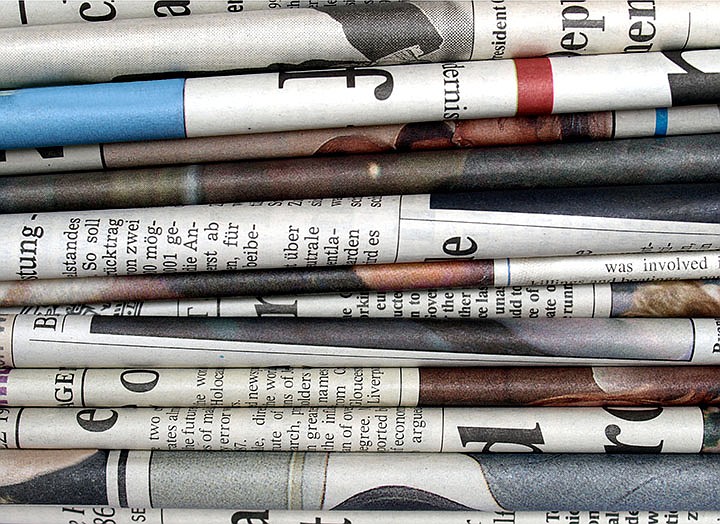Okay, it's not a Nazi book burning, but the Citrus County, Florida, commissioners refusing to fund an annual digital subscription to The New York Times for the public library comes close - especially when you consider their reasoning.
"Fake news, I agree with President Trump," said Commissioner Scott Carnahan. "I don't want the New York Times in this county. I don't agree with it, I don't like 'em, it's fake news and I'm voting no. They can take that money and do something else with it ... I support Donald Trump."
That money - $2,700 a year - would provide an online read of the nation's paper of record for 70,000 Citrus County library cardholders. But the commissioners, five middle-aged or older white guys elected in their very conservative area north of Tampa, didn't quibble so much with the cost. What they all spoke about, according to news reports in the Citrus County Chronicle and The Washington Post, was The Times' content. And their own politics.
"I support President Trump," Commissioner Brian Coleman told the Chronicle. "I would say they [The Times] put stuff in there that's not necessarily verified."
The library already has a print subscription to The Times, but two of the county's four branch libraries only get the paper on Sunday. Library officials had hoped to broaden the system's reach - a mission implied in any public library system.
The commission's decision came on the same day The Wall Street Journal reported that the White House planned to direct government staffers not to renew federal agencies' subscriptions to The Times and The Washington Post for the same reason.
President Trump told Fox News host Sean Hannity, "We don't even want [The Times] in the White House anymore. "We're going to probably terminate that and The Washington Post. They're fake."
No, they're not. The two papers have been among the leading news sources in investigating Trump and have closely covered the impeachment inquiry that threatens his presidency.
The Times won a Pulitzer Prize earlier this year for a series of stories detailing Trump's inheritance from his father and his family's history of using questionable and possibly illegal strategies to avoid taxes. And in 2018, The Times and The Post shared a Pulitzer for documenting Russian interference in the 2016 presidential election and its connections to Trump's campaign and his transition team and administration. In 2016, The Post's David Fahrenthold won a Pulitzer for coverage "casting doubt on Donald Trump's assertions of generosity toward charities."
Meanwhile, back in the central Florida, the local censorship move made quite a stir, and at least one commissioner is now saying the board needs to revisit the decision.
"The Chronicle's website and Facebook page were inundated with comments from readers, and the newsroom received calls and emails throughout the day Monday. Most, but not all, were critical of the county's decision," according to a Chronicle update story last week.
An online commenter on that story posted: "Such a sad day for Citrus County. Freedom in this country is based on freedom of the press, not freedom for the press I like. ... And it's one of the reasons it's written into the Constitution. Can't wait until the next election cycle."
Another wrote: "The idea behind public libraries is to use public funds to ensure all residents access to a wide variety of reading materials, now expanded to listening and viewing materials as well. A well informed citizenry will enhance the democratic process. This is the same reasoning behind taxes for public schools. A well educated population will improve everyone's quality of life."
Still another posted: "OK, so let's cancel ALL subscriptions to ALL newspapers and let the people pay for their own subscriptions. In fact, ... let's get rid of all of those pesky, liberal, socialist libraries so that absolutely NO taxes will be wasted on any opportunities for Citrus County residents to read and think."
In case you're wondering, The Public Library here in Chattanooga has several newspaper print subscriptions, including to The Chattanooga Times Free Press, The Wall Street Journal, The New York Times and The Tennessee Tribune.
Digitally, the downtown library and its three branches have access to The New York Times, The Washington Post, Christian Science Monitor, the Knoxville News Sentinel, The (Nashville) Tennessean and others, according to library Executive Director Corinne Hill. In addition, cardholders can read digital versions of some 600 magazines, including the New Yorker, Time and Vanity Fair.
Because Chattanooga funds the Public Library, cards for city residents and businesses are free. Hamilton County K-12 public school students also receive free library cards when they enroll in school. But all other county residents - because our county commissioners do not fund the library - must pay a $50 annual fee for a card.
No, refusing to fund subscriptions to newspapers and magazines - or library systems - isn't the same as book burnings. But it is a play right out of any authoritarian government's favorite black book. Freedom to read, think and learn is right up there with freedom of the press.
